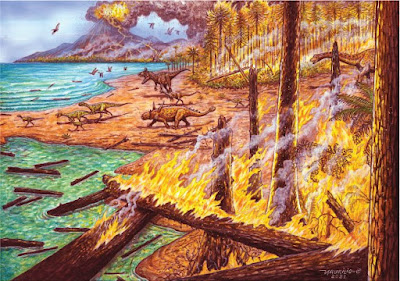During the late Cretaceous period (100 million to 66 million years ago), one of the warmest periods on Earth, Antarctica's James Ross Island was home to a temperate forest of conifers, ferns, and flowering plants known as angiosperms, as well as to a slew of dinosaurs.
But it wasn't a total paradise; ancient paleo-fires burned parts of those forests to a crisp, leaving behind charcoal remnants that scientists have now scooped up and studied.
Reconstruction of paleo-wildfires in Antarctica during the Cretaceous.
(Maurilio Oliveira)
"This discovery expands the knowledge about the occurrence of vegetation fires during the Cretaceous, showing that such episodes were more common than previously imagined," study lead researcher Flaviana Jorge de Lima, a paleobiologist at Federal University of Pernambuco in Recife, Brazil, said in a statement.
The finding marks the first evidence on record of a paleo-fire on James Ross Island, a part of the Antarctic Peninsula that now sits below South America.
The discovery adds evidence that spontaneous fires were common in Antarctica during the Campanian age (about 84 million to 72 million years ago); in 2015, in a separate study, researchers documented the first known evidence of dinosaur-age wildfires in West Antarctica, according to a study in the journal Palaeogeography, Palaeoclimatology, Palaeoecology.
For the new work, an international team of scientists analyzed fossils collected during a 2015-2016 expedition to the northeastern part of James Ross Island. These fossils contained fragments of plants that looked like charcoal residue, which had weathered away over the past tens of millions of years.
The charcoal fragments were small – the largest paper-thin pieces were just 0.7 by 1.5 inches (19 by 38 millimeters). But scanning electron microscope images revealed their identity: These fossils are likely burned gymnosperms, likely from a botanical family of coniferous trees called Araucariaceae, the researchers found.
A fossilized piece of charcoal next to a coin.
(De Lima et al., Polar Research, 2021)
During the late Cretaceous, the supercontinent of Gondwana was breaking up, leaving places like Antarctica more isolated than before. This ice-free region had plenty of ignition sources, including lightning strikes, fireballs from falling meteors, and volcanic activity, as well as flammable vegetation and high oxygen levels, which help fires burn, the researchers noted.
"Antarctica had intense volcanic activity caused by tectonics during the Cretaceous, as suggested by the presence of fossil remains in strata related to ash falls," the researchers wrote in the study. "It is plausible that volcanic activity ignited the paleo-wildfire that created the charcoal reported here."
Now, the researchers are looking for new records of paleo-fires in other locations in Antarctica.
The study was published online Oct. 20 in the journal Polar Research.
Recommend this post and follow
The Life of Earth




No comments:
Post a Comment
Stick to the subject, NO religion, or Party politics